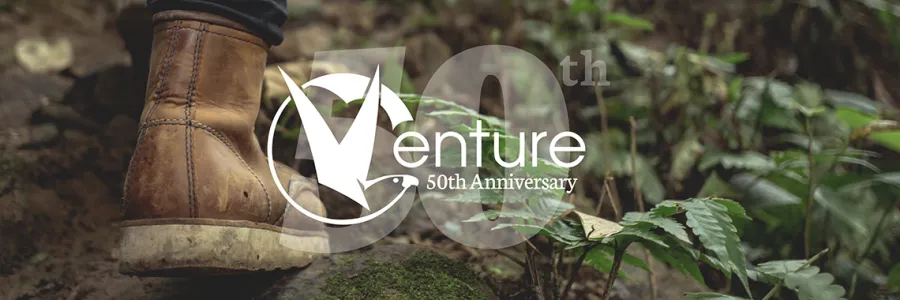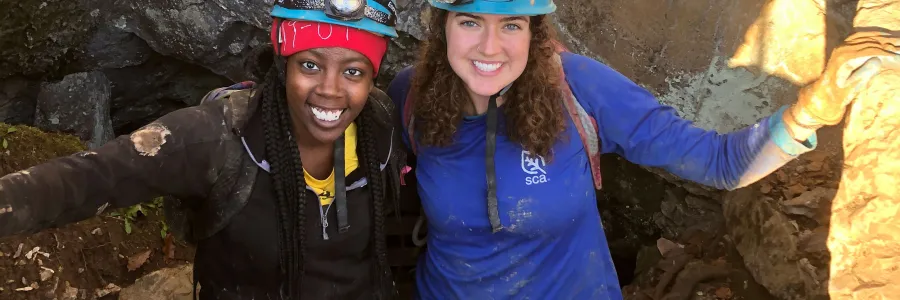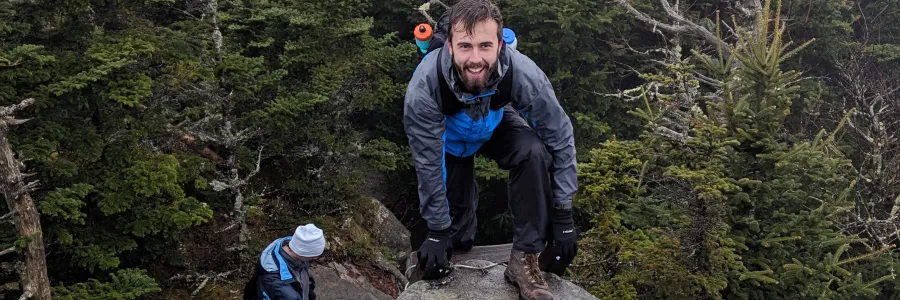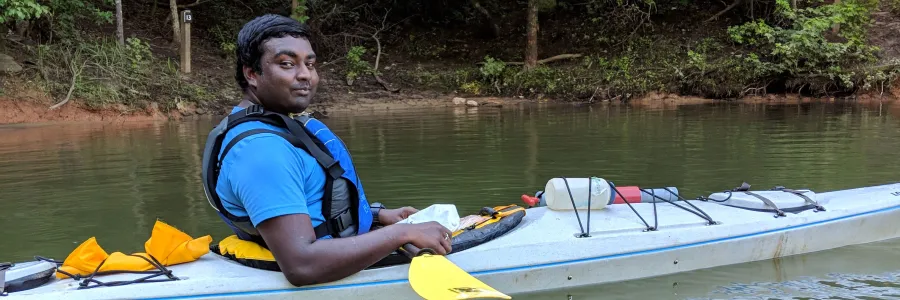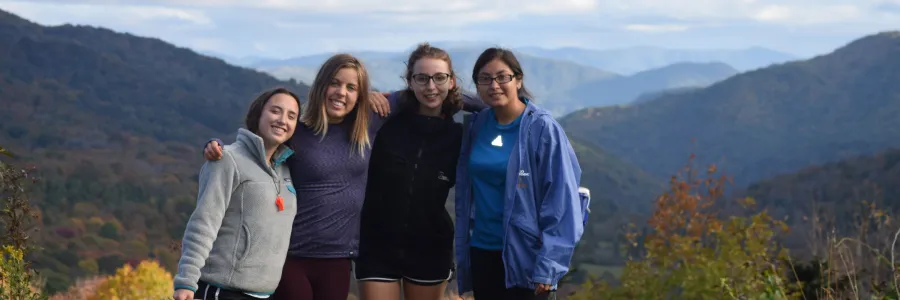- Meet people and build friendships
- Build your confidence by challenging yourself mentally, emotionally and physically
- Learn transferable leadership skills
- Disconnect from technology and experience the beauty of nature.
- Learn the basics of rock climbing, caving, hiking and more!
- Have fun!
Most trips are led by our student leaders. These students are:
- Extensively trained in risk management, technical skills, teaching, and facilitation.
- Certified in Wilderness and Remote First Aid.
- Passionate about building community and sharing their love and knowledge of adventure education.
Some trips may be led by a professional staff member. Our professional staff are:
- Certified Wilderness First Responders.
- Have years (often decades!) of training and experience in adventure education, training, and leadership.
- Trips are open to UNC Charlotte students, faculty, staff, and community members.
- Most people on any given trip is an undergraduate student.
- Beginner friendly - most trips are designed for beginners.
You do not have to be an athlete or expert backpacker to do well on adventure trips!
There are two kinds of strength you will use on your course: Mental and Physical.
- You may find that being open minded, being compassionate, and having a teamwork mentality will be more important than your physical strength alone.
- If you have any concerns about being able to physically complete this trip, please speak with your health care provider.
- The health form you submit during registration will be reviewed by the University health center.
- However, this does not replace the recommendations of your personal physician/ health care provider(s).
Please be in touch if we can make accommodations that may make a trip accessible to you. We welcome that conversation and would like to make this experience available to as many students as we can.
- You will meet us at UNC Charlotte's main campus on the first day of the trip.
- Your trip leaders will drive you and the rest of the group to the trip area in our University van.
- You will all return to main campus at the end of the trip in that same van.
If you are going on an overnight trip, such as backpacking, you will sleep in tent or tarp each night. We will not sleep in a cabin or other type of shelter.
- You will share the tent/ tarp with other students on the trip (following COVID-19 best practices).
- We will provide the equipment and the knowledge on how to sleep safely in a tent/ tarp.
Since you will typically sleep in small groups of 2 or 3, we may provide you the option to share with us your preferred sleeping arrangements (e.g. if you prefer same gender or gender-inclusive sleeping arrangements). We will use this information to begin planning tent/ tarp sleeping arrangements. No sleeping arrangements will be confirmed without your input.
- We will provide you all of the technical equipment, such as a backpack, sleeping bag, tent/ tarp, cooking supplies, and rock climbing equipment.
- You can borrow, at no additional cost, technical clothing you may need, such as rain jacket, rain pants, and warm layers like thermal underwear and fleece jackets.
You must provide:
- Your base layer clothing, including shirts, pants and underwear
- Backpacking boots that fully cover and support your ankles
You will receive a packing list and additional guidance when you register.
For a day trip, we will provide lunch and snacks.
For an overnight trip, we typically provide 3 meals a day and snacks.
- We design meals and snacks to meet the needs of long days on the trail.
- You will have enough food to meet your energy needs, though you may not eat to the fullness you are used to when at home. Remember that we have to carry everything with us - so it all has to fit in our backpacks.
- Typical breakfast - Instant oatmeal/ grits; or Bagel with peanut butter/ Sunbutter.
- Typical lunch - Wrap or sandwich with options for: pepperoni, cheese, spinach, hummus, bell pepper, peanut butter/ Sunbutter, and jelly.
- Typical dinner -
- Base of rice, quinoa or pasta
- A few fresh veggies (e.g. onion, bell pepper, squash)
- Protein source such as beans, canned chicken/ tuna, pepperoni
- Flavored with our amazing spice kit!
- Generally, yes, we can manage many food restrictions and dietary needs.
- Common dietary needs we accommodate include: food intolerances (such as dairy and gluten), vegan/ vegetarian diets, and halal and kosher diets.
- If you have a food allergy or condition such as celiac, we will have a conversation about its severity, your reaction when exposed, and how/ if we can avoid cross-contamination. Be sure to include this information on your medical form.
This might be the most common question for people new to adventure trips.
- Your leaders will teach you how to manage human waste and periods before you leave for the trip.
- You will also receive information on period and vulva care in your welcome packet if you will be on an overnight trip.
We follow the guidelines of Leave-No-Trace and the wilderness area we are in to determine how to manage human waste.
- Generally, we will use 1 or more of 3 practices:
- Pit toilet - Use a compositing toilet that is typically built near campsites.
- Cat hole - Create your own composting "toilet" by burying your waste in the ground.
- Pack it out - In high impact areas, we may use specially designed products to carry out our waste.
People who have periods and/or vulvas have a few more steps to take than others when it comes to backcountry hygiene, but it will quickly become part of your daily routine.
- You will receive a detailed list of items to pack to create a "bathroom kit".
- This kit will make sure you have items to help you stay clean, dry and ready for a day of hiking.
Why do we have our own medical history form?
- We may be in a wilderness setting without access to definitive medical care, such as an emergency room or cell phone service to call 9-1-1.
- Adventure activities come with inherent risks. One way to help reduce or mitigate those risks is to collect some basic medical history on every person who will be on the trip.
- The form also collects information on your food restrictions/ allergies and sleeping arrangement preferences/ needs. While it may not be strictly medical, this information will help us create a safe program for you.
Who will see your medical form?
- Forms are reviewed and "approved" by a University physician.
- If you receive notification from Niner Engage that the physician has commented, respond as soon as possible.
- Often it means there are some clarifications needed.
- You will not be able to participate in a trip without an approved medical history form.
- Venture Outdoor Leadership professional staff (e.g. Assistant Director for Trips) and the Lead for that trip will review your form.
- Anyone with access to your form has a clean Criminal Background Check that is resubmitted yearly.
- Anyone with access will also have a certification in wilderness medicine, such as Wilderness and Remote First Aid.
You can contact our front office or stop by our office suite in Belk Gym.
- venturedept@charlotte.edu
- 704-687-0697
Typical office hours: Monday - Friday, 8:00am to 5:00pm
